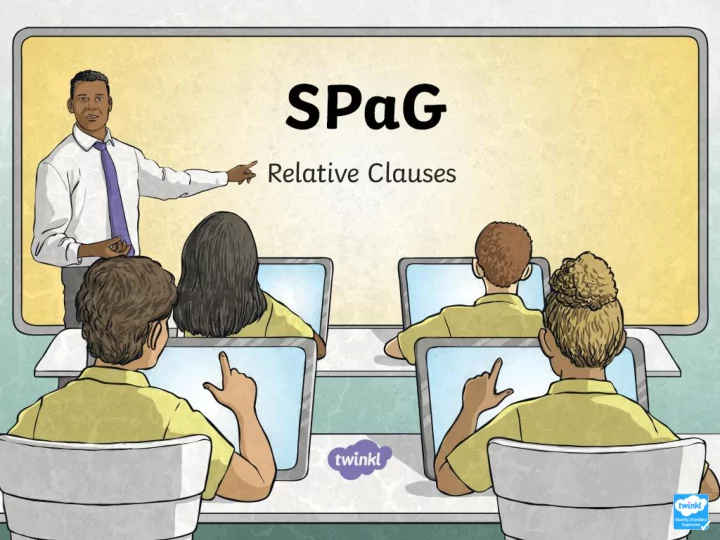

Aim • To identify and use relative clauses. Success Criteria • I can explain that a complex sentence has at least two clauses. • I can identify and use relative pronouns and relative clauses. • I can write sentences that include relative clauses.
Relative Clauses and Relative Pronouns Let’s start with a simple sentence. ✓ A simple sentence has one main clause = subject + verb . ✓ A simple sentence must make sense on its own. Example: John was playing the piano. The simple sentence isn’t very interesting, is it? Why don’t we add some extra information? John was playing the piano. He was in the hall.
Relative Clauses and Relative Pronouns OK, still rather simple. How could we improve it? Let’s make it a complex sentence. We can do this by adding a subordinate clause to the main clause. The subordinate clause must have its own subject and verb. The subordinate clause does not make sense on its own.
Relative Clauses and Relative Pronouns John was playing the piano. The second sentence adds some extra information to the first one, so we can add it to the simple sentence to make a complex sentence, like this: John, who was in the hall , was playing the piano. The subordinate clause does not make sense on its own.
Relative Clauses and Relative Pronouns We’ve dropped in a relative clause! A relative clause gives us extra information about the noun in the main clause. It is connected to the main clause by a relative pronoun . We’ve replaced the pronoun in the second sentence with the relative pronoun – who.
Relative Clauses and Relative Pronouns John was playing the piano. He was in the hall. relative pronoun John, who was in the hall , was playing the piano. relative clause main clause
Relative Clauses and Relative Pronouns John, who was in the hall , was playing the piano. Here are some other relative clauses you could add to this sentence: John, whose hair flopped as he moved his arms , was playing the piano. John, who had just eaten a light lunch , was playing the piano.
Relative Clauses and Relative Pronouns Relative clauses often start with relative pronouns. These words are relative pronouns:
Relative Clauses and Relative Pronouns ‘Where’ is a relative adverb, but it is used in exactly the same way as a Relative clauses often start with relative pronouns. relative pronoun.
Relative Clauses and Relative Pronouns A relative clause (a clause which gives you extra information about a noun) might be at the end of a sentence or within the sentence. I ran quickly towards the oak tree, which had stood in that spot for hundreds of years . My grandmother, whose shiny hair sparkled in the morning sunshine , stood looking over the bay.
Relative Clauses and Relative Pronouns Here are the main points about relative clauses and relative pronouns: John was playing the piano. He was in the hall. relative pronoun John, who was in the hall , was playing the piano. relative clause main clause
Relative Clauses and Relative Pronouns Relative clauses add information to a sentence, using relative pronouns. A relative pronoun is usually seen in a sentence at the beginning of a relative clause. A relative clause functions as an adjective, modifying nouns and pronouns. A relative clause starts with either a relative adverb (where) or a relative pronoun: that, who, whom, whose, which.
The following are examples of sentences that have relative clauses starting with relative pronouns. Can you identify the relative pronouns? a. Spaghetti, which many of us enjoy, can be messy. b. This is the book that everyone is talking about. c. She wrote to the person whom she had met last month. d. We didn’t bring the receipt, which was a big mistake. e. I have a friend whose cat is annoying. f. People who are clever can always find a way. g. Grandma remembers a time when radio shows were popular. h. Never go to a doctor whose office plants have died. - Erma Bombeck i. The driver who went through the stop sign was careless.
Answers: a. Spaghetti, which many of us enjoy, can be messy. b. This is the book that everyone is talking about. c. She wrote to the person whom she had met last month. d. We didn’t bring the receipt, which was a big mistake. e. I have a friend whose cat is annoying. f. People who are clever can always find a way. g. Grandma remembers a time when radio shows were popular. h. Never go to a doctor whose office plants have died. - Erma Bombeck i. The driver who went through the stop sign was careless.
Task: Using your group’s task sheet, highlight the clauses in each sentence. Choose two colours and use one to highlight main clauses and the other colour to highlight the relative clauses.
Recommend
More recommend